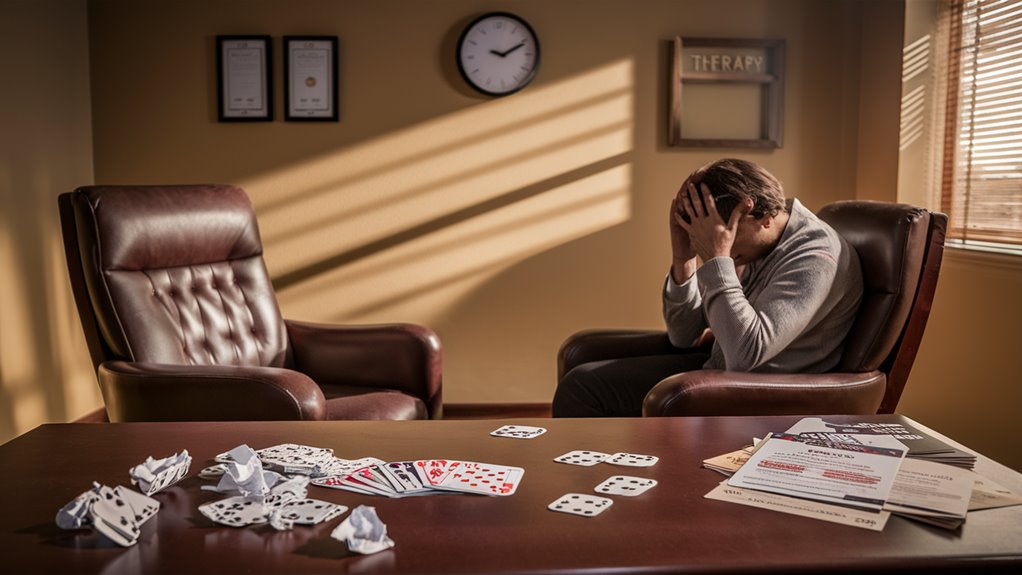How Gambling Affects Your Mind – What You Should Know

Problem gambling causes deep changes in the brain and mind, hurting mental health badly. Studies reveal that chronic gambling leads to big shifts in the brain’s reward system, just like with drug addiction. Those with gambling issues are 400% more likely to suffer from major depression, and often have bad anxiety and sleep issues.
The mental impact of gambling goes further, leading to:
- Poor choices
- Constant gambling thoughts 토토사이트
- Big mood swings
- Deep shame and guilt
- Worse personal ties
- Being alone and pulling away
The brain’s response to heavy gambling sets up a tough cycle of seeking rewards which gets harder to break. This cycle hurts the ability to think clearly, manage feelings, and make good choices. As the addiction gets stronger, stress goes up, impulse control drops, and pleasure in other activities goes down.
Many need professional help to deal with both the mental symptoms and root habits. Spotting early signs and knowing the big effects on mental health is key to start healing and getting better.
The Mind Side of Problem Gambling
Understanding the Brain’s Role
Dopamine, a key brain chemical for rewards, is central to gambling addiction. When gamblers win, their brain releases a lot of dopamine, which feels very good, much like drug highs.
This brain reaction strongly pushes the behavior, making gambling very drawing for those at risk.
Main Psychological Parts
The Almost-Win Effect and Chasing Losses
Near-wins set off brain signals almost like real wins, keeping up the gambling even with losses.
Chasing losses is a big risk, as gamblers try to win back money by gambling more, creating a harmful loop.
Variable rewards make gambling even more addictive, as random wins hook players more than steady ones.
Thinking Mistakes and Emotional Triggers
Problem gambling lives off certain mind errors:
- Gambler’s mistake – wrongly thinking past games affect future games
- Control illusion – thinking they can shape random events
- Selective memory – remembering wins over losses
These mind tricks mix with emotional pulls like stress, anxiety, and depression.
Gambling often acts as a poor way to handle problems, giving short peace but harming mental health more as time goes on.
Knowing these psychological parts is key to develop good help plans and treatment methods.
Signs of Mental Trouble
Mental Trouble Signs in Problem Gambling
What to Watch For
Mental signs slowly show as gambling grows.
Early signs include:
- Constant worry over money
- Pulling away from friends and family
- Huge mood changes tied to gambling wins or losses
Depression and Mental Symptoms
Depression often comes with gambling issues through:
- Broken sleep
- Less joy in fun activities
- Thoughts of self-harm
- Quick anger if gambling is stopped
- Poor focus affecting job
What You Might Notice
Mental decline often shows in many ways:
- Lying about gambling
- Strong shame and guilt
- Ignoring personal care
- Wrong thoughts about gambling results
- Lucky betting moves
Physical Signs
- Non-stop headaches
- Stomach problems
- High blood pressure
These signs call for quick professional help.
Seeing these patterns early helps in better healing.
How Depression and Anxiety Tie In
Know the Link Between Depression, Anxiety, and Gambling
How They Connect
Problem gambling makes a tough loop with depression and anxiety, making mental health worse.
The tie between them shows how gambling actions start from and add to emotional pain.
Depression’s Role
Depression often pushes people to gamble as a way out.
The short high from bets offers a break from sad feelings, but losses usually make depression deeper, setting a bad cycle.
Studies show problem gamblers are about four times more likely to get major depression.
Anxiety and Gambling
Anxiety disorders and gambling are a bad mix.
Money stress from losses raises anxiety, while many oddly use gambling hoping to fix their money worry.
Research says problem gamblers are three times more likely to have an anxiety disorder.
The Body’s Reaction and Stress
The body’s reaction to gambling includes:
- Faster heart rate
- More sweating
- Tense muscles
- Stronger stress reaction
These signs match anxiety symptoms, linking gambling and anxiety issues more.
The body’s stress response when gambling can start and grow anxiety troubles, making this link worse.
What It Does to Close Ones
How Gambling Hurts Close Ties

Breaking Family Bonds
Problem gambling harms all parts of close ties, badly hurting connections with family, friends, and loved ones.
The addiction breaks trust with lies like hidden losses, borrowed money without asking, and broken stop-gambling promises.
Money problems cause big fights, often talks, and feeling disconnected from each other.
Kids Feel It Too
Kids of problem gamblers face big mind troubles, with studies showing more neglect, home fights, and anxiety and depression risks.
These early hard times often lead to bond issues and trouble keeping good ties as grown-ups.
Studies say these kids also show more behavior problems and school troubles.
Being Alone and Losing Friends
The pulling away seen in gambling addiction harms a lot. As the addiction gets worse, gamblers often leave social events, miss big family times, and ignore help from caring ones.
They care more and more just about gambling, while good ties break down.
Shame and stigma around gambling issues build walls keeping true connections or help away, keeping a bad cycle of being alone and gambling.
Fixing It
Healing help and getting professional care is key to fix broken ties. Good healing often needs:
- Family meetings with a therapist
- Building trust again
- Looking after money well
- Open talks
- Joining support groups
These steps tackle both the addiction and its harms on close ones.
Ending the Addiction Loop
Ending the Addiction Loop: A Full Guide to Gambling Healing
Knowing the Addiction Loop
The addiction loop goes through a set pattern of triggers, urges, acts, and results.
Knowing this loop helps make good help plans and get long healing from gambling addiction.
Finding and Handling Triggers
Places and feelings often start the urge to gamble. Common triggers include:
- Money worry
- Feeling down or stressed
- Group pressure
- Places linked to past gambling
Treatment Based on Proof
Mind Behavior Therapy (CBT)
CBT methods target wrong mind sets and build good ways to handle problems. This therapy especially works on:
- Seeing through the almost-win trick
- Fixing wrong beliefs
- Knowing risks better
- Changing how you act
Support and Care Networks
Staying well needs strong support groups:
- Groups for gambling issues
- Family therapy meetings
- Talking with peers
- Guidance from professionals
- Help from the community
Plans for Full Healing
Help plans should look at all parts of addiction:
- Money advice
- Handling debt
- Fixing relationships
- Lowering stress
- Avoiding triggers
Making Recovery Last
Getting free from gambling addiction needs:
- Going to therapy often
- Staying with support groups
- Keeping away from triggers
- Being careful with money
- Changing how you live
Healing well depends on staying with long-term behavior shifts and using pros when needed.
Treatment You Can Get
Pro Help for Gambling Issues
Treatments That Are Proven
Mind Behavior Therapy (CBT) is a main way to tackle gambling addiction, with structured help to spot and change problem acts.
Trained pros lead patients through finding triggers, fixing thoughts, and learning good ways to deal with issues. This therapy shows good results in stopping a return to gambling and keeping better long-term.
Full Program Options
Staying at a Treatment Place
Treatment homes give strong, all-day care in a controlled setting. These places bring together varied treatment types, including:
- Daily therapy talks
- Learning about addiction
- Money handling training
- Planning to avoid relapse
Flexible Program Choices
Adjustable programs let people get care while keeping up with day-to-day needs. Services usually include:
- Regular talk sessions
- Group therapy
- Family help programs
- Quick help services
Help With Meds
Med-help is key when looking at dual disorders. Pros may give:
- Meds for managing depression
- Mood helpers for emotional control
- Anxiety meds when needed
Support and More Care
Help groups better treatment results through:
- Peer groups
- Family therapy
- Money advice help
- Care after main treatment
- Plans to avoid falling back
Each part of treatment works together to form a full framework for recovery, looking at both the addiction and causes behind it.
Building Good Ways to Cope
Building Good Ways to Cope in Healing
Key Ways to Handle Stress
Handling stress is key to stop addiction. Deep breaths, muscle ease, and mind calmness quickly help manage pulls that usually lead to gambling. These proven ways give fast peace and build strong mind strength over time.
Working Out Helps Healing
Regular working out helps a lot in healing by two main ways. Exercise plans naturally lower stress while making feel-good brain chemicals that take the place of gambling’s highs. Planned actions like group sports, walking in nature, or gym classes build good habits that use both body and mind.
Money Plans to Protect
Good money plans are a must to keep safe in healing. Making strong money rules includes:
- Set budgets
- Limiting how much you can take out Poker Mistakes
- Rules on accounts
- Working with money pros
Making Strong Help Groups
Good help groups give needed responsibility and choices other than gambling places. Key parts include:
- Often going to support meetings
- Making family ties stronger
- Making friends who don’t gamble
- Doing healthy group things
The mix of these good ways to cope makes a full plan for lasting healing, looking at both quick triggers and long-term behavior change needs.
